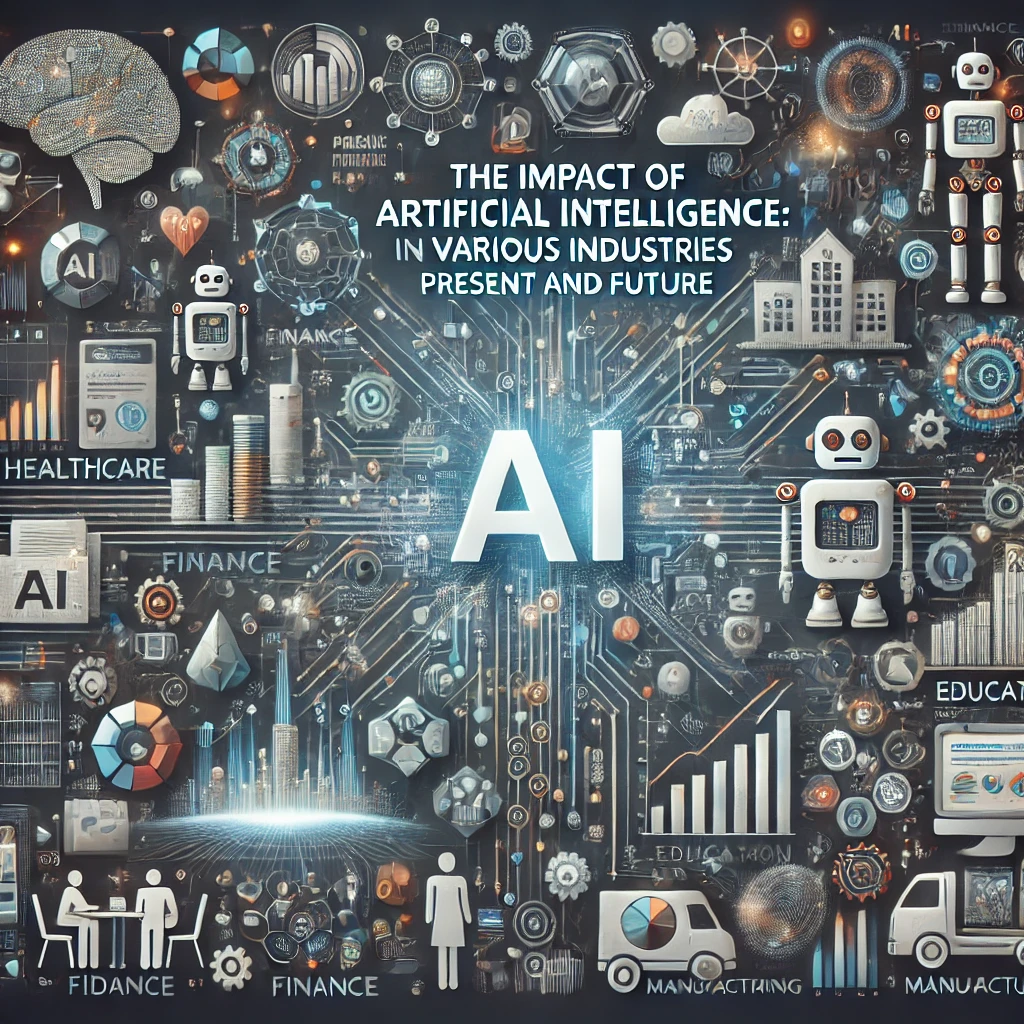
Introduction
Artificial Intelligence (AI) has become a transformative force across multiple industries, redefining how businesses operate, interact with consumers, and make strategic decisions. From healthcare and finance to manufacturing and education, AI is not just a futuristic concept anymore but a practical tool revolutionizing industries today. This article explores AI’s current impact on different sectors and its future potential.
How AI Is Transforming Various Industries
1. Healthcare
AI in healthcare has enabled advanced diagnostics, personalized treatments, and streamlined administrative tasks. AI-powered systems can analyze vast datasets to predict diseases, helping healthcare professionals make informed decisions quickly. For example, AI algorithms in imaging can detect early signs of cancer, enhancing treatment outcomes. In the future, AI could facilitate real-time health monitoring, leading to proactive patient care and significantly reducing emergency cases.
2. Finance
In the finance sector, AI is used for risk assessment, fraud detection, algorithmic trading, and personalized financial advice. AI algorithms analyze patterns in large volumes of transaction data to detect fraud almost instantly, protecting both institutions and consumers. With robo-advisors, individuals can receive personalized investment advice, making financial planning more accessible. The future promises even more efficient financial management tools and predictive insights that help individuals and organizations make smarter investment decisions.
3. Manufacturing
AI has brought about a significant shift in the manufacturing industry, particularly in automation and predictive maintenance. Smart factories use AI to monitor machinery, predicting potential issues before they cause downtime. Robotics and AI-driven systems streamline production, improve efficiency, and reduce waste. Moving forward, AI could enhance fully automated production lines, making manufacturing safer and more sustainable.
4. Education
AI in education is creating personalized learning experiences for students, enhancing engagement and comprehension. Adaptive learning platforms assess students' strengths and weaknesses, tailoring content accordingly. AI also assists educators by grading assignments and tracking student progress, allowing teachers to focus on more meaningful interactions. In the future, AI could facilitate global classrooms, making quality education accessible to students in remote areas.
5. Retail
AI’s impact on retail is evident in personalized shopping experiences, inventory management, and customer service. AI algorithms analyze customer data to offer personalized product recommendations and targeted advertising. Chatbots provide instant customer support, enhancing customer satisfaction. Future developments may include fully AI-managed stores, where customers can have a seamless, personalized shopping experience with minimal human interaction.
6. Transportation
The transportation industry is on the brink of a major AI-driven transformation, with self-driving cars being the most prominent example. AI is used for traffic prediction, route optimization, and enhancing safety features in vehicles. Autonomous vehicles could make transportation safer and more efficient, reducing traffic accidents and emissions. In the future, we may see fully automated public transportation systems, making travel more accessible and sustainable.
Future Prospects of AI Across Industries
As AI technology advances, its role across industries is expected to deepen. Here’s a glimpse into what the future might hold:
- Increased Automation: AI will automate more complex tasks, allowing human workers to focus on strategic, high-level responsibilities.
- Enhanced Decision-Making: Predictive analytics powered by AI will enable organizations to make data-driven decisions with a higher degree of accuracy.
- Greater Personalization: AI will continue to personalize user experiences, from healthcare and education to shopping and entertainment.
- Interdisciplinary Collaboration: AI advancements will lead to more cross-industry collaborations, creating innovative solutions that integrate diverse expertise.
Challenges and Ethical Considerations
Despite its potential, AI implementation brings several challenges. Privacy concerns, job displacement, and ethical considerations are significant issues to address. For example, while AI streamlines processes, it can lead to reduced demand for certain types of jobs. Ensuring AI systems are transparent, fair, and free of bias is crucial for its ethical application.
Conclusion
AI’s impact on industries today is profound, and its potential for the future is limitless. By continuing to invest in AI development responsibly, businesses can leverage its capabilities to improve efficiency, deliver better customer experiences, and foster innovation. As we look forward, balancing AI’s benefits with ethical considerations will be key to ensuring it remains a force for positive change across industries.